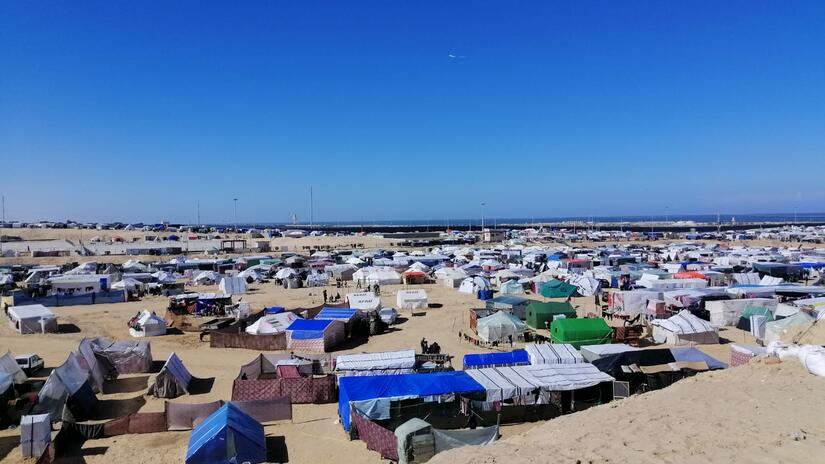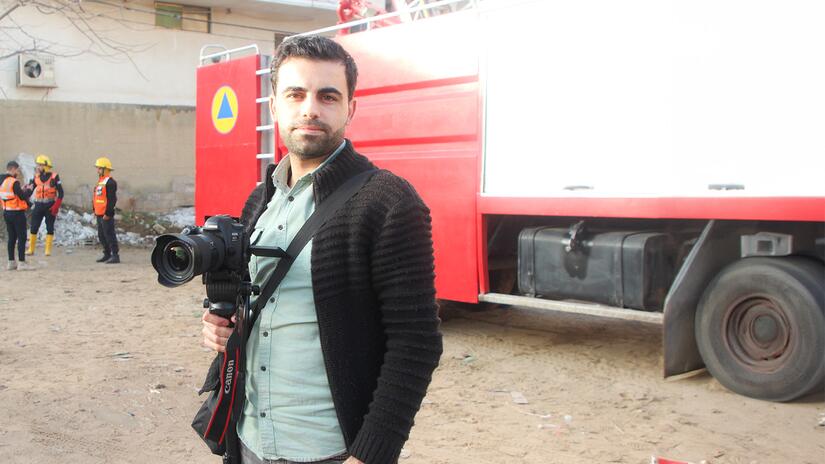The people next door: An ongoing series about people helping others even as they face the very same struggles
Every day, Amr would normally wake up knowing he first must secure food and water for himself and his family. Then, he heads to work.
Amr Ali is a media officer at the Palestine Red Crescent Society (PRCS). Much like every other citizen in Gaza, he also struggles to protect his family and make decisions regarding what to do next, or how to act, in the ongoing armed violence.
As part of his job, Amr documents PRCS’s activities, such as the emergency response and the distribution of food, water, and relief items.
“I was talking to some people who are currently taking shelter in the PRCS building,” said Amr via WhatsApp messages.
“They asked me ‘what should we do? where should we go and how can we protect our children?’ I couldn’t answer them because I have the same questions.”
Stories of loss
As part of his work, Amr tries to highlight rights violations and the suffering of people in Gaza; he listens to the staff and displaced people staying at PRCS headquarters – stories of loss, injury, evacuation and displacement.
“There are so many tragic stories that have been engraved in my memory, from scenes that I’ve witnessed during my response to injured people in need, the dead and their families; these scenes will never be erased from my memory. I’m struggling with insomnia because I fear that my loved ones may suffer the same fate,” he said.
Amr has heard stories from friends, of them forced to walk for hours from Gaza City, in the north, to the south of the Gaza Strip, of how there were explosions along the way, and how they had to turn back the first time they tried to flee.
“My friend’s sister was terrified and she unable to move at the time. He had to help her walk while also helping his three young children,” Amr said. The whole family eventually made it.

As part of his job, Amr Ali took photos like this one and told the stories of people displaced by the fighting. Now he and his family are also displaced and living in a camp.
Photo: Amr Ali/Palestine Red Crescent Society
On the move
Due to the conflict, Amr also left the north with his family, and temporarily moved to his brother’s house in Khan Yunis, where 30 other people were also staying. He doesn’t know anything about the current state of his home, and the last update he received was a picture showing that his house was partially damaged. However, it’s not his house he’s most concerned about, it’s the children.
“It’s very bad for the children.” he said. “They are afraid and don’t know what is happening or why it’s happening. I try to play with them, and I make loud noises to distract them from what’s happening outside.”
“A few days ago, my kid asked me to make him a sandwich, because he was starving. I couldn’t make him anything because we had no flour, no bread, and no biscuits” he said.
“I feel like a useless father who cannot do the simplest thing for his son.”
Falling off the radar
As the situation worsened, Amr and his family had to travel further south, where they don’t know anyone and have nowhere to stay. The family is currently living in a tent.
And like many caught up in the crisis, Amr has fallen out of touch. The destruction of infrastructure and the ensuing communications blackouts has made communication nearly impossible — even for a communications specialist like Amr. Recent attempts to reach out to Amr to check up on him and request some of his photographic work in Gaza were unsuccessful.
Amr’s situation is playing out in homes across Gaza Strip, as food and water become scarcer, and infections are on the rise. Ongoing fighting has left families struggling with what to do next.
The Palestine Red Crescent Society staff and volunteers are providing medical care in hospitals and medical posts, ambulance services, public health messaging, and psychosocial support to people in Gaza. Teams are also coordinating the reception and distribution of life-saving aid, such as food, water, medicine, and other emergency items. They do this despite worrying for the suffering of their families and living in the difficult conditions themselves.





